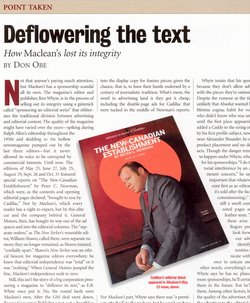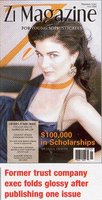All the better to eat you with
I'm all for editorial integrity and protecting readers because lose them and we've killed the goose with the golden eggs. But, to switch fables, there's been a run on Little Red Riding Hood editors whining about protecting their virginal magazine integrity from the big bad advertising wolves. One editor with real conviction, even if possibly misguided and myopic, actually walked away from a losing battle with her publisher (does anybody really know what terribly whorish concession Kim Pittaway was asked to do before she decided her editorial chastity was preferable to her job at Chatelaine?).
The latest example of editorial's obsession with advertising encroachment is the November issue of Masthead with four separate references in the first five pages (including Bill Shields Editor's Note) plus another somewhat surprising mention in the Q&A with Rob Young of the media buying giant PHD Canada (not HYPN as reported on the cover).
 The main Masthead piece on the subject of integrity was inked by (and he probably still composes in ink) Don Obe and it focuses on Maclean's running a Peter C. Newman series on the New-Canadian Establishment that was sponsored by Cadillac.
The main Masthead piece on the subject of integrity was inked by (and he probably still composes in ink) Don Obe and it focuses on Maclean's running a Peter C. Newman series on the New-Canadian Establishment that was sponsored by Cadillac.
Don writes well but he's out of touch and I doubt he fully appreciates:
 a. where the money comes from (hint: it's not the reader)?
a. where the money comes from (hint: it's not the reader)?
and
b. why ad sales people earn so much more than editors (big hint: it's a difficult and sometimes humiliating job that few intelligent people will or can do)?
It was a very different world the last time Don actually edited a real magazine. Back then advertisers would politely call to book space at the rate card rate and ask for a right-hand page if at all possible. And there were maybe 50 magazines in the whole world. Now there are like 75 thousand in western Canada alone. This competition is making it tough for everybody and advertisers are well aware of our desperation to fill pages.
Perhaps we can keep the wolf at bay by:
a. having readers pay $50-100 for a subscription to a monthly (as if!)
b. giving up on print and move to an electronic-only model like salon.com
 c. preventing the publication of new pissant magazines that feel entitled to a share of the advertising market. Make magazine publishing a closed business society like taxi cabs, street vendors and major league baseball – by license or regulated expansion only. That will prevent the next loser magazine like Zi from thinking publishing is fun and an easy way to make money while messing it up for the rest of us.
c. preventing the publication of new pissant magazines that feel entitled to a share of the advertising market. Make magazine publishing a closed business society like taxi cabs, street vendors and major league baseball – by license or regulated expansion only. That will prevent the next loser magazine like Zi from thinking publishing is fun and an easy way to make money while messing it up for the rest of us.
Until then, when an advertiser is willing to pony up for sponsored editorial like Cadillac did, ask yourself if the reader relationship is really being damaged. Ken Whyte did and came to the right conclusion. For years we have listened to the "brought to you by…" line on radio and television. Newspapers have ads on every editorial page including page one. So what is so precious that we are protecting in the magazine medium? Toronto Life and Canadian Geographic sell front cover sponsorships to their guides. Is the Toronto Life Restaurant Guide to be treated differently than the April Toronto Life restaurant issue? Why not cut them out of the magazine awards (oh, just noticed that three of ten NMAF board members are Toronto Life employees. How did that happen?)
P.S. According to Masthead contributor D. B. Scott (Nov 2005, page 6, column 3) – a P.S. always gets read so if you are here and didn't read the actual blog, please scroll up the page and try again. Otherwise, I think Stan Sutter (editor of Marketing magazine) got it right in his column in the November 28 issue – "Inching up to the line" which also makes reference to the Cadillac-Maclean's conspiracy. Read it here.
The latest example of editorial's obsession with advertising encroachment is the November issue of Masthead with four separate references in the first five pages (including Bill Shields Editor's Note) plus another somewhat surprising mention in the Q&A with Rob Young of the media buying giant PHD Canada (not HYPN as reported on the cover).
 The main Masthead piece on the subject of integrity was inked by (and he probably still composes in ink) Don Obe and it focuses on Maclean's running a Peter C. Newman series on the New-Canadian Establishment that was sponsored by Cadillac.
The main Masthead piece on the subject of integrity was inked by (and he probably still composes in ink) Don Obe and it focuses on Maclean's running a Peter C. Newman series on the New-Canadian Establishment that was sponsored by Cadillac.Don writes well but he's out of touch and I doubt he fully appreciates:
 a. where the money comes from (hint: it's not the reader)?
a. where the money comes from (hint: it's not the reader)?and
b. why ad sales people earn so much more than editors (big hint: it's a difficult and sometimes humiliating job that few intelligent people will or can do)?
It was a very different world the last time Don actually edited a real magazine. Back then advertisers would politely call to book space at the rate card rate and ask for a right-hand page if at all possible. And there were maybe 50 magazines in the whole world. Now there are like 75 thousand in western Canada alone. This competition is making it tough for everybody and advertisers are well aware of our desperation to fill pages.
Perhaps we can keep the wolf at bay by:
a. having readers pay $50-100 for a subscription to a monthly (as if!)
b. giving up on print and move to an electronic-only model like salon.com
 c. preventing the publication of new pissant magazines that feel entitled to a share of the advertising market. Make magazine publishing a closed business society like taxi cabs, street vendors and major league baseball – by license or regulated expansion only. That will prevent the next loser magazine like Zi from thinking publishing is fun and an easy way to make money while messing it up for the rest of us.
c. preventing the publication of new pissant magazines that feel entitled to a share of the advertising market. Make magazine publishing a closed business society like taxi cabs, street vendors and major league baseball – by license or regulated expansion only. That will prevent the next loser magazine like Zi from thinking publishing is fun and an easy way to make money while messing it up for the rest of us.Until then, when an advertiser is willing to pony up for sponsored editorial like Cadillac did, ask yourself if the reader relationship is really being damaged. Ken Whyte did and came to the right conclusion. For years we have listened to the "brought to you by…" line on radio and television. Newspapers have ads on every editorial page including page one. So what is so precious that we are protecting in the magazine medium? Toronto Life and Canadian Geographic sell front cover sponsorships to their guides. Is the Toronto Life Restaurant Guide to be treated differently than the April Toronto Life restaurant issue? Why not cut them out of the magazine awards (oh, just noticed that three of ten NMAF board members are Toronto Life employees. How did that happen?)
P.S. According to Masthead contributor D. B. Scott (Nov 2005, page 6, column 3) – a P.S. always gets read so if you are here and didn't read the actual blog, please scroll up the page and try again. Otherwise, I think Stan Sutter (editor of Marketing magazine) got it right in his column in the November 28 issue – "Inching up to the line" which also makes reference to the Cadillac-Maclean's conspiracy. Read it here.

